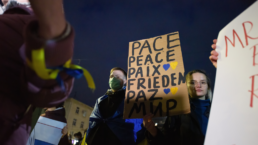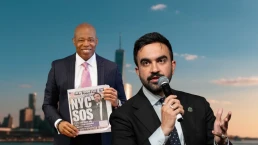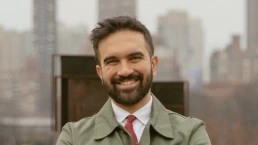Vladimir Putin has launched his invasion of Ukraine, seemingly expecting that his forces can subdue Ukrainian resistance. But the attack could severely destabilize his regime — with Russians already showing a notable lack of enthusiasm for war.
By Ilya Matveev and Ilya Budraitskis, Jacobin
Russia attacked Ukraine last night. The worst fears have been confirmed. The extent of the invasion is not fully understood, but it is already clear that the Russian military has attacked targets all over the country, not just in the South-East (along the border of the so-called “people’s republics”). This morning, Ukrainians in various cities were woken by explosions.
Vladimir Putin has made clear the military objective of the operation: the complete surrender of the Ukrainian army. The political plan remains unclear — but perhaps most likely means the establishment of a pro-Russian government in Kiev. The Russian leadership assumes that resistance will quickly be broken and that most ordinary Ukrainians will dutifully accept the new regime. The social consequences for Russia itself will obviously be severe — already in the morning, even before Western sanctions were announced, Russian stock exchanges collapsed and the fall in the ruble broke all records.

Putin’s speech last night, in which he announced the outbreak of war, represented the unconcealed language of imperialism and colonialism. In this sense, his is the only government that so openly speaks like an imperialist power from the early twentieth century. The Kremlin is no longer able to hide behind other grievances — including even NATO enlargement — its hatred of Ukraine and desire to teach it a punitive “lesson.” These actions are beyond rationally understood “interests” and lie somewhere in the realm of “historical mission,” as Putin understands it.
Since Alexei Navalny’s arrest in January 2021, police and the security services have essentially crushed the organized opposition in Russia. Navalny’s organization was deemed “extremist” and dismantled, demonstrations in his defense resulted in some fifteen thousand arrests, and almost all independent media were either closed down or branded “foreign agents,” severely limiting their operation. Mass demonstrations against the war are unlikely — there is no political force capable of coordinating them and participation in any street protest, including even a single-person picket, is swiftly and severely punished. Activist and intellectual milieus in Russia are shocked and demoralized by the events.
Recent Posts
The Rage Of Billionaires And The Frenzy To Stop Zohran Mamdani From Becoming New York’s Mayor
June 30, 2025
Take Action Now The constellation of forces now regrouping with a vengeance includes titans of Wall Street, enormous real estate interests,…
It’s Not Just The Cities. Extreme Heat Is A Growing Threat To Rural America.
June 28, 2025
Take Action Now The urban heat island sits in a rural heat ocean.By Umair Irfan, Vox Summer has officially begun with a blast of scorching…
Mamdani’s Massive Victory Should Show Democrats Where The Party’s Future Lies
June 27, 2025
Take Action Now NYC mayoral candidate Zohran Mamdani has thrown the drowning Democratic Party a life vest. Will its leaders use it?By Sam…
India Walton’s Advice For Zohran Mamdani
June 26, 2025
Take Action Now “I think that for him, the race ’til November needs to be staying on message—we can’t start to water it down…




